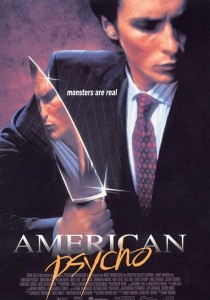I’m not a fan of the “It was only a dream” method of story-telling. Having said that, I can’t imagine who would be, as it’s essentially a big practical joke perpetrated on the audience by the screenwriter. I’m not referring to movies such as The Sixth Sense or The Fight Club, where you can go back and watch it a second time, seeing things you’d never noticed before (though I should add that I think the latter of the two does this far less consistently), because those are ultimately very satisfying. It’s movies like The Usual Suspects that leave us at the end of the film having no idea what’s even happened, wondering if we’ve just been lied to the whole time and if anything we’ve seen was actually real at all. I wind up walking out of those flicks irritated, feeling as though the filmmakers were expressing contempt for the audience.
 So, when pondering today’s, “Freakishly Weird Ending” – which is irritatingly vague, as that could mean the most freakishly weird or my favorite of such – I began thinking of American Psycho. (It should go without saying from here on out that one should assume SPOILERS for the film.) This movie is more akin to The Usual Suspects, as the end leads you to wonder just what the hell you’ve been doing with the last two hours of your life. But don’t get me wrong; it’s quite marvelously entertaining, so you don’t really care. Throughout, it seems as though you’re witnessing blistering social satire, as the protagonist, Patrick Bateman, gets away repeatedly and (seemingly) literally with murder. Set in the eighties among the fabled yuppie class of New York City, it seems likely that we’re to take from this that very little matters to these people other than money, drugs, status, and the next trend, and that they simply just don’t notice that there’s a monster in their midst.
So, when pondering today’s, “Freakishly Weird Ending” – which is irritatingly vague, as that could mean the most freakishly weird or my favorite of such – I began thinking of American Psycho. (It should go without saying from here on out that one should assume SPOILERS for the film.) This movie is more akin to The Usual Suspects, as the end leads you to wonder just what the hell you’ve been doing with the last two hours of your life. But don’t get me wrong; it’s quite marvelously entertaining, so you don’t really care. Throughout, it seems as though you’re witnessing blistering social satire, as the protagonist, Patrick Bateman, gets away repeatedly and (seemingly) literally with murder. Set in the eighties among the fabled yuppie class of New York City, it seems likely that we’re to take from this that very little matters to these people other than money, drugs, status, and the next trend, and that they simply just don’t notice that there’s a monster in their midst.
But then things get more and more outlandish and fantasy-like as Bateman goes on a killing spree through the city, complete with police chases and sentient ATMs, landing himself huddled under his desk confessing to his lawyer by phone (a scene, by the way, which is one very good reason why Christian Bale is a beloved cult actor). In the end, it seems as though the people he’s killed just might not be dead, as bodies he’s stored are no longer where he put them and people claim to have lunched with another just days before. So, this could be the “Protagonist is Crazy” variation of the “It’s Only a Dream” theme, but for the fact that the filmmakers themselves claim that was not their intent; it seems the book, by Bret Easton Ellis, is rather ambiguous about the particulars, and they wanted to come down strongly on the side of Bateman actually being a killer, with the point being to send-up the shallow society that surrounds him.
Those filmmakers admit to and bemoan the fact that they failed in this by making things far too outlandish, but I think the story goes wrong by including a sort of “control” character by the name of Jean. She’s his secretary, clearly has a crush on him, and is the only one who he seems to allow to see behind the facade. She’s wholly unlike the others, and Bateman is the most sincere and genuine with her. He comically tries to bring himself to kill her before giving up and very brokenly asking her to leave, saying, “I think if you stay, something bad will happen. I think I might hurt you. You don’t want to get hurt, do you?”
Inter-cut with the revelation in the final scene that no one believes he’s killed anybody (either because they are blind and don’t care or because he actually didn’t), is Jean flipping through his planner back at the office, seeing it riddled with progressively more and more graphic doodles by Bateman. She’s disturbed and heartbroken to see it, but if the idea was supposed to be that he’s going to get away with it all because of society’s apathy, they’ve failed to take into account that Jean is not a part of the drugged and compromised clique otherwise surrounding him. If he’s killed anybody, she’s going to let people know. Thus…
It was all just happening in his head: the protagonist is crazy. Unfortunately, the film happened to just get away from a sincere effort to head for an entirely different theme (if only just to those of us who don’t buy the alternative), making this possibly the most unintentional ending in film. Either way, it’s social commentary, because none of his peers seem to care that he’s crazy and thinks he’s killed a lot of people. Either way, it’s freakish, but it is an enjoyable ride nonetheless.